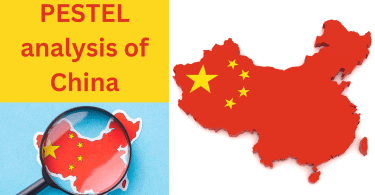In the dynamic and ever-evolving landscape of global logistics, understanding the complexities of the macro environment is paramount for making informed and strategic decisions.
In this context, a detailed PESTEL analysis becomes not just a tool but a guiding light, illuminating the path to strategic excellence for FedEx.
This exploration is not just an academic exercise but a strategic imperative, providing a holistic view that empowers decision-makers to anticipate challenges, leverage opportunities, and position the organization for sustained success in an ever-changing global landscape.
Delving into the political, economic, social, technological, environmental, and legal aspects, a thorough examination of FedEx’s macro environment reveals key insights crucial for shaping effective strategies.
FedEx overview
Origins and Evolution:
- Founded in 1971 by Frederick W. Smith with a vision for overnight delivery.
- Started with 14 jets and 389 packages, operating within the US.
- Grew through organic expansion and strategic acquisitions, like TNT Express in 2016.
- Today, it’s a multinational conglomerate with diverse services.
Spectrum of Services:
- FedEx Express: Time-definite deliveries, including overnight and international options.
- FedEx Ground: Cost-effective ground shipping solution for less urgent needs.
- FedEx Freight: Handles larger cargo through less-than-truckload (LTL) and truckload freight services.
- FedEx Supply Chain: Provides end-to-end supply chain management solutions for businesses.
- FedEx Office: Offers printing, copying, and shipping services through retail locations.
Navigating the Competitive Landscape:
- Key competitors include United Parcel Service (UPS), DHL, and Deutsche Post.
- Competition intensifies in e-commerce and international markets, driving innovation and cost reductions.
- FedEx differentiates itself through:
- Extensive global network;
- Diverse service portfolio;
- Focus on technology and automation.
A World-Spanning Network:
- Operates in over 220 countries and territories, offering global reach.
- Possesses a vast air and ground network, facilitating seamless movement of goods.
- Strategic partnerships with other carriers further expand its reach and service offerings.
The Power of People:
- Over 600,000 employees represent a diverse and multicultural workforce.
- Strong focus on employee training and development to maintain a skilled workforce.
- Employees are considered the backbone of FedEx’s success and customer satisfaction.
Serving Diverse Customers:
- Caters to individuals, businesses of all sizes, and e-commerce merchants.
- Prioritizes customer satisfaction and loyalty through reliable service and personalized solutions.
- Technology empowers customers with convenient tools for tracking, shipping management, and online solutions.
Charting the Course:
- Focuses on growth in e-commerce and international expansion to capture emerging markets.
- Invests in automation and sustainability initiatives to optimize operations and reduce environmental impact.
- Commits to continuous innovation and enhancing customer experience through cutting-edge solutions.
Key Figures (as of February 2024):
- Sales: $93.5 billion (Fiscal Year 2023)
- Number of countries served: more than 220
- Employees: more than 600,000
- Aircraft fleet: 693 (including owned and leased).
Now, let’s jump into the PESTEL analysis results of FedEx!
Political environment
Predicting the future is always tricky, but several critical international political developments could positively or negatively impact FedEx’s growth and sustainability in the coming years.
Here’s a breakdown of both potential scenarios:
Opportunities:
- Increased trade agreements: If trade agreements expand, particularly between high-growth economies, it could lead to a significant increase in international shipments, benefiting FedEx.
- Political stability in crucial markets: Stable political environments in countries like India, Brazil, and Southeast Asia could boost FedEx’s presence and growth potential in these regions.
- Investment in infrastructure: Government investments in logistics infrastructure, such as airports and roads, could improve efficiency and reduce costs for FedEx.
- Relaxation of trade regulations: Streamlined customs procedures and reduced trade barriers could facilitate faster and smoother movement of goods across borders, benefiting FedEx’s international operations.
Threats:
- Trade wars and protectionism: Rising trade tensions and protectionist policies could restrict international trade, leading to declining shipments and negatively impacting FedEx’s revenue.
- Political instability in key markets: Political unrest, coups, or wars in critical markets could disrupt operations, damage infrastructure, and increase security risks for FedEx.
- Changes in trade regulations: Unexpected changes in rules, such as increased tariffs or stricter security measures, could increase costs and complexity for FedEx, impacting its profitability.
- Geopolitical tensions: Tensions between significant powers, such as the US and China, could lead to sanctions, airspace restrictions, or other disruptions that hinder FedEx’s operations.
Economic environment
The international economic environment, such as unemployment, inflation, exchange rates, and recession, can significantly impact FedEx’s growth.
Here’s a breakdown of how these factors may affect the company:
Unemployment:
High unemployment rates can reduce consumer spending and business activities, impacting FedEx’s shipping volumes.
During economic downturns, businesses may cut back on their shipping needs, affecting the demand for FedEx’s services.
Inflation:
Inflation can affect FedEx’s operating costs. Rising fuel, labor, and other resource prices may increase the company’s expenses. Managing these costs efficiently becomes crucial for maintaining profitability.
Exchange Rates:
FedEx operates globally, and fluctuations in exchange rates can impact its financial performance. A strong U.S. dollar relative to other currencies can make FedEx’s services more expensive for international customers, potentially decreasing demand.
Recession after Covid-19:
A global recession can decrease manufacturing, trade, and overall economic activity. As a result, businesses cut costs, and consumers reduce spending, reducing demand for shipping services.
Conversely, shipping volumes may also rebound during the recovery phase as economic activities pick up. Also, during the initial phases of the COVID-19 pandemic, there was a surge in e-commerce activities as people shifted to online shopping—this increased demand for shipping services, benefiting companies like FedEx.
FedEx reported strong financial results in its fiscal year 2021, with revenue growth driven by increased e-commerce demand. However, challenges such as higher operating costs due to the pandemic and supply chain disruptions were noted.
Social environment
Social and Cultural Opportunities for FedEx:
Sustainability: Growing consumer demand for eco-friendly practices presents an opportunity for FedEx to:
- Invest in green initiatives: Reduce carbon footprint through electric vehicles, sustainable packaging, and renewable energy.
- Offer carbon-neutral shipping options: Cater to environmentally conscious customers willing to pay a premium for sustainable deliveries.
Example: FedEx recently announced a $2 billion investment in clean technologies, aiming to achieve carbon-neutral operations by 2040.
Changing Demographics: Evolving consumer preferences and behavior offer various opportunities:
- Personalization: Offer customized delivery options like flexible delivery times and locations to cater to individual needs.
- Social media engagement: Leverage social media to connect with customers personally and build brand loyalty.
Example: A 2023 study by Accenture found that 83% of global consumers are willing to pay more for sustainable products and services.
Increasing Urbanization: Growing urban populations with fast-paced lifestyles create demand for:
- On-demand delivery services: Offer same-day or express deliveries within cities to cater to convenience-driven customers.
- Urban infrastructure investment: Build efficient delivery networks within cities to optimize last-mile deliveries.
Statistics: The UN projects that by 2050, 68% of the world’s population will live in urban areas, driving demand for efficient urban logistics solutions.
Social and Cultural Threats for FedEx:
Labour Concerns: Rising concerns about worker rights and fair treatment could negatively impact public perception. FedEx needs to:
- Ensure reasonable labor practices: Implement ethical sourcing and pay standards throughout its supply chain.
- Advocate for worker rights: Support policies that protect worker rights and safety globally.
Example: Recent reports of labor unionization attempts at FedEx facilities highlight the need to address worker concerns proactively.
Data Privacy: Growing anxieties about data privacy and security could create challenges:
- Implement robust data security measures: Protect customer data from breaches and misuse.
- Be transparent about data practices: Communicate how customer data is collected, used, and protected.
Example: The increasing number of data privacy regulations globally requires companies like FedEx to comply with stricter data protection standards.
Cultural Sensitivity: Operating in diverse markets requires cultural sensitivity to avoid:
- Offending local customs or traditions: Be mindful of cultural differences when designing marketing campaigns and operating practices.
- Unintentional bias: Implement inclusive hiring practices and policies that avoid cultural discrimination.
Statistics: A 2023 poll by the Pew Research Center found that 72% of Americans are concerned about how companies collect and use their data.
By navigating these social and cultural opportunities and threats effectively, FedEx can build stronger relationships with its customers, communities, and employees, ultimately contributing to its long-term success in the international courier market.
Technological environment
The technological landscape presents significant opportunities and challenges for FedEx in the international courier market.
In terms of opportunities, automation, and robotics offer the potential to streamline warehouse operations and optimize last-mile deliveries through autonomous vehicles.
FedEx has already demonstrated its commitment by investing in robotic arms for package sorting and testing autonomous delivery drones in rural areas.
Advanced analytics and AI provide avenues for predictive demand forecasting and more efficient route planning, with FedEx using AI to enhance its network responsiveness during peak shipping periods.
Additionally, blockchain technology can improve supply chain transparency and streamline trade finance, with FedEx exploring partnerships for these solutions.
However, technological threats pose concerns for FedEx. Cybersecurity threats, including data breaches and ransomware attacks, can disrupt operations and damage the company’s reputation.
Protection of sensitive customer data becomes crucial, especially in light of a past cyberattack on FedEx in 2022.
The emergence of disruptive technologies, such as innovative delivery solutions from new entrants like drone delivery startups or hyperloop technology, poses a potential challenge to FedEx’s traditional courier models.
Navigating data privacy regulations, with different countries having varying laws, adds complexity, requiring FedEx to balance data collection and customer privacy effectively.
Recent statistics underline the growing importance of technology in the logistics industry, with projections indicating substantial market growth.
The global robotics market for logistics is expected to reach $36.6 billion by 2026, and AI spending in the supply chain management sector is projected to reach $16.8 billion by 2025.
The blockchain market is estimated to reach $33.6 billion by 2027, while the anticipated cost of cybercrime globally is expected to reach $10.5 trillion by 2025.
In summary, FedEx can leverage technology to secure a competitive edge in the international courier market by embracing innovation, investing in cybersecurity, and navigating regulatory complexities.
Ecological environment
Ecological Opportunities:
FedEx has the opportunity to significantly reduce its environmental impact and enhance sustainability in the international courier market. Initiatives to reduce the carbon footprint include:
- Investing in electric, hybrid, or alternative fuel vehicles to minimize emissions.
- Optimizing delivery routes to minimize unnecessary travel distances and fuel consumption.
- Powering facilities with renewable energy sources.
An example of this commitment is FedEx’s goal to achieve carbon-neutral operations by 2040, with investments in electric delivery vehicles and sustainable aviation fuel.
Additionally, adopting sustainable packaging practices, such as using eco-friendly materials, minimizing packaging waste, and offering take-back programs, can contribute to environmental conservation.
FedEx’s participation in carbon offset projects and providing carbon-neutral shipping options further showcases its commitment to offsetting emissions and promoting environmental responsibility.
Ecological Threats:
While FedEx pursues ecological opportunities, it faces potential climate change impacts, pollution, waste, and resource depletion threats.
Climate change-related threats include disruptions from extreme weather events, such as hurricanes or floods, and the potential impact of rising sea levels on coastal facilities.
Regulatory challenges, such as carbon pricing, could raise operational costs. Pollution and waste threats arise from air pollution generated by transportation, improper disposal of plastic packaging contributing to pollution, and the addition of non-recyclable packaging to landfills.
Resource depletion concerns encompass fossil fuel dependence for transportation, potential deforestation due to sourcing wood-based packaging materials, and significant water usage for operations.
To summarize, FedEx has the opportunity to lead in environmental stewardship by embracing ecological initiatives, but it must also navigate potential threats to ensure sustainable practices.
Proactive measures to address these environmental opportunities and threats will contribute to a more sustainable future for the international courier market and position FedEx as a responsible and environmentally conscious industry leader.
Balancing these considerations will be crucial for FedEx to demonstrate its commitment to environmental leadership and maintain a competitive edge in a rapidly evolving and environmentally conscious global market.
Legal environment
Legal Opportunities for FedEx in the International Courier Market:
Trade Agreement Negotiations:
FedEx can capitalize on legal opportunities by negotiating favorable terms in trade agreements, securing reduced tariffs, streamlining customs procedures, and improving market access.
Advocating for open trade policies aligns with promoting free trade principles, creating a more predictable and efficient operating environment.
An example is the recent renegotiation of the North American Free Trade Agreement (NAFTA) among the US, Mexico, and Canada, potentially providing FedEx with new cross-border shipping opportunities.
Emerging Regulatory Landscape:
Adapting to new data privacy, security, and e-commerce regulations presents an opportunity for FedEx to mitigate legal risks and build trust with customers.
Advocating for laws facilitating innovation and fair competition allows FedEx to shape industry-friendly regulations, creating a favorable operating environment.
The implementation of the General Data Protection Regulation (GDPR) globally has prompted FedEx to adapt its data practices and policies.
Intellectual Property Protection:
Securing intellectual property (IP) rights for technologies and branding protects FedEx’s innovation and prevents unauthorized use.
Enforcing these IP rights strategically becomes crucial in preserving a competitive advantage. FedEx actively defends the trademarks and patents associated with its logistics technologies and services.
Legal Threats for FedEx in the International Courier Market:
Trade Wars and Sanctions:
Legal threats arise from trade wars and sanctions, which lead to disruptions in global trade, restrict market access, and increase operational costs.
Complying with complex regulations related to sanctions and trade disputes poses challenges. The ongoing trade war between the US and China has impacted FedEx operations and introduced uncertainty in the market.
Antitrust Laws:
Navigating scrutiny of market dominance and fair competition under antitrust laws poses a legal threat. Concerns about antitrust violations can lead to legal investigations and potential penalties.
Compliance with different antitrust laws across various jurisdictions presents a complex challenge. In 2021, the European Commission opened an investigation into possible antitrust violations by FedEx related to its express delivery services.
Consumer Protection Regulations:
Compliance with complex consumer protection laws, which encompass data privacy, delivery timeframes, and complaint handling, is crucial.
Non-compliance may result in potential lawsuits or fines, highlighting the importance of adhering to these regulations.
In 2022, FedEx faced lawsuits in the US for alleged delays and lost packages, underscoring the significance of regulatory adherence.
By proactively navigating the legal landscape, staying informed about emerging regulations, and advocating for favorable trade policies, FedEx can mitigate legal risks and seize opportunities presented by the evolving legal environment in the international courier market.
Conclusion
In conclusion, the PESTEL analysis sheds light on the macro-environmental factors impacting FedEx’s operations. To ensure longevity and expansion in a dynamic global landscape, FedEx must strategically adapt to these factors.
Leveraging technological opportunities, such as automation and data analytics, can enhance efficiency and customer satisfaction. Embracing ecological opportunities, like reducing carbon footprint and sustainable practices, aligns with environmental consciousness and positions FedEx favorably in the eyes of increasingly eco-aware consumers.
Navigating trade agreements, staying compliant with emerging regulations, and safeguarding intellectual property will be critical in the legal realm.
Furthermore, recognizing and mitigating potential threats, such as trade wars and legal challenges, should be a central focus. Proactive measures to navigate these threats include effective advocacy for open trade policies, adapting to new regulatory landscapes, and ensuring compliance with consumer protection laws.
FedEx can make informed strategic decisions by continuously monitoring and adjusting to the PESTEL factors, ensuring resilience, longevity, and successful expansion in the international courier market.
The company’s commitment to innovation, sustainability, and legal compliance will be instrumental in shaping a future where FedEx survives and thrives amid ever-changing macro-environmental dynamics.
PESTEL analysis examples 2024
To better understand the PESTEL analysis, we invite you to read our recent free examples of the Pestel framework.
PESTEL analysis of Primark
Click here to read our example of Primark’s PESTEL analysis.
PESTEL analysis of Zara
Click here to read our example of Zara’s PESTEL analysis.
PESTEL analysis of DHL
Click here to read our example of DHL’s PESTEL analysis.
PESTEL analysis of Chipotle
Click here to read our example of Chipotle’s PESTEL analysis.
PESTEL analysis of Brazil
Click here to read our example of Pestel’s analysis of Brazil.
PESTEL analysis of Spotify
Click here to read our example of Spotify Pestel analysis.
Chick-fil-A PESTEL Analysis
Click here to read our example of Chick-fil-A Pestel analysis.
Costco PESTEL Analysis
Click here to read our example of Costco Pestel analysis.
Microsoft PESTEL Analysis
Click here to read our example of Microsoft Pestel analysis.
Disney PESTEL Analysis
Click here to read our example of Disney Pestel analysis.
Airline Industry PESTEL Analysis
Click here to read our example of the Airline industry Pestel analysis.
Walmart Pestel Analysis
Click here to read our example of Walmart Pestel analysis.
Amazon Pestel Analysis
Click here to read our example of Amazon Pestel analysis.
McDonald’s Pestel Analysis
Click here to read our example of the Netflix Pestel analysis.
Netflix Pestel Analysis
Click here to read our example of the Netflix Pestel analysis.
Apple Pestel Analysis
Click here to read our example of the Apple Pestel analysis.
Twitter Pestel Analysis
Click here to read our example of the Twitter Pestel analysis.
Facebook Pestel Analysis
Click here to read our example of the Facebook Pestel analysis.
Pestel analysis of the Social Media industry
Click here to read our example of the Pestel analysis of the Social Media industry.
Ikea Pestel Analysis
Click here to read our example of the IKEA Pestel analysis.
Tesla Pestel Analysis
Click here to read our example of the TESLA Pestel analysis.












Leave a Comment